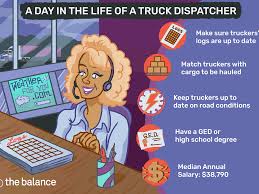Truck dispatching is a critical function in the trucking industry, ensuring the efficient movement of goods from one location to another.2 Truck dispatchers are responsible for coordinating the transportation of goods by managing truck schedules, routes, and communication between drivers and clients.34 They play a vital role in ensuring that goods are delivered on time and within budget.5

The Role of Truck Dispatchers
Truck dispatchers perform a variety of tasks, including:
- Finding loads: Dispatchers use load boards and other resources to find loads for trucks.6
- Negotiating rates: Dispatchers negotiate rates with brokers and shippers.7
- Assigning drivers to loads: Dispatchers assign drivers to loads based on their availability, experience, and location.8
- Planning routes: Dispatchers plan routes for drivers, taking into account factors such as traffic, weather, and road closures.9
- Monitoring drivers: Dispatchers monitor drivers’ progress and provide support as needed.10
- Communicating with clients and drivers: Dispatchers communicate with clients and drivers to keep them informed about the status of their shipments.11
The Challenges of Truck Dispatching
Truck dispatching is a challenging job. Dispatchers must be able to:
- Multitask: Dispatchers must be able to handle multiple tasks at once, such as finding loads, negotiating rates, and communicating with drivers.12
- Work under pressure: Dispatchers must be able to work under pressure to meet deadlines and ensure that shipments are delivered on time.13
- Solve problems: Dispatchers must be able to solve problems quickly and efficiently, such as when there are delays or other unexpected events.14
- Communicate effectively: Dispatchers must be able to communicate effectively with drivers, clients, and other stakeholders.15
- Stay organized: Dispatchers must be able to stay organized and keep track of all the details of their shipments.

Technologies That Are Transforming Truck Dispatching
A number of technologies are transforming the truck dispatching industry, making it more efficient and effective.16 These technologies include:
- Load boards: Load boards are online platforms that connect shippers with carriers.17 Dispatchers use load boards to find loads for their trucks.18
- GPS tracking: GPS tracking allows dispatchers to track the location of their trucks in real time.19 This information can be used to optimize routes and ensure that shipments are delivered on time.20
- Electronic logging devices (ELDs): ELDs are devices that track drivers’ hours of service.21 Dispatchers use ELDs to ensure that drivers are compliant with regulations.22
- Dispatch software: Dispatch software helps dispatchers to manage their operations more efficiently.23 This software can be used to track shipments, communicate with drivers, and generate reports.24
The Future of Truck Dispatching
The truck dispatching industry is constantly evolving. New technologies are being developed that will make it even more efficient and effective. In the future, dispatchers will be able to use artificial intelligence (AI) and machine learning to optimize routes, predict delays, and improve communication.25

Conclusion
Truck dispatching is a critical function in the trucking industry. Dispatchers play a vital role in ensuring that goods are delivered on time and within budget.26 A number of technologies are transforming the truck dispatching industry, making it more efficient and effective. The future of truck dispatching is bright, and dispatchers will continue to play a vital role in the movement of goods around the world.
External Links







Leave a Reply